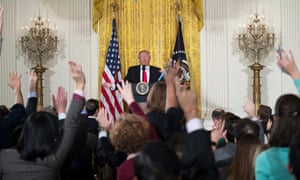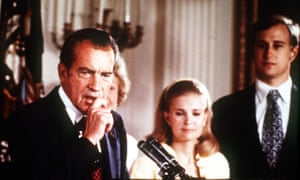The president’s belligerent approach to the press may distract from
problems in the short term, experts say, but history shows such
hostility can end badly


Though it was ostensibly called to announce his new nominee for the Department of Labor, Donald Trump’s 77-minute freewheeling press conference on Thursday spent little time on the matter.
Instead, speaking to a room of reporters who repeatedly sought to clarify when and if Trump staffers had had contact with Russians, he recast the event as a referendum on reporters everywhere.
The president claimed that the media served not the people but “special interests”, reaping profits from a rigged system, and he sought to tar the press as universally untrustworthy. “The press has become so dishonest that if we don’t talk about it we are doing a tremendous disservice to the American people. The press are out of control. The level of dishonesty is out of control,” he said.
He launched aggressive broadsides at individual journalists, as when Trump asked black journalist April Ryan if she would schedule a meeting with the Congressional Black Caucus for him. “Are they friends of yours?” he said.
And Trump referred to the media as an entrenched “power structure” and vowed to go around it entirely. “We’re not going to let it happen. I’m here again to take my message straight to the people,” he said.
Instead, speaking to a room of reporters who repeatedly sought to clarify when and if Trump staffers had had contact with Russians, he recast the event as a referendum on reporters everywhere.
The president claimed that the media served not the people but “special interests”, reaping profits from a rigged system, and he sought to tar the press as universally untrustworthy. “The press has become so dishonest that if we don’t talk about it we are doing a tremendous disservice to the American people. The press are out of control. The level of dishonesty is out of control,” he said.
He launched aggressive broadsides at individual journalists, as when Trump asked black journalist April Ryan if she would schedule a meeting with the Congressional Black Caucus for him. “Are they friends of yours?” he said.
And Trump referred to the media as an entrenched “power structure” and vowed to go around it entirely. “We’re not going to let it happen. I’m here again to take my message straight to the people,” he said.
“This level of public vitriol directed at the news media by the president is unprecedented in American history,” said Mark Feldstein, a former CNN correspondent and professor of journalism at the University of Maryland.
“No president has ever declared war and given such loud voice to that unhappiness in his very first week. Actually, his very first day,” said George Condon, a former president of the White House Correspondents Association who spent a career covering presidents.
Trump’s White House has been off to a rocky start. Less than a month into his tenure, during what is traditionally a honeymoon period, Trump has the lowest approval ratings of any recent president at this point. His former national security adviser, Michael Flynn, is the shortest-serving in history after being forced out following an inappropriate discussion with the Russian ambassador. And Trump’s cabinet is one of the slowest to be filled in history.
Trump is blaming the media for these failings as the bearer of bad news, not its creator, said Frank Sesno, a veteran former journalist who runs the School of Media and Public Affairs at George Washington University.
“It is not the media that made the call to the Russians. It is not the media that apparently lied to the vice-president. It is not the media that prompted six Republicans to tank the labor secretary nominee. It’s not the media that ruled against the immigration ban,” Sesno said. “Instead, he’s isolating, accusing, distracting, demonizing and blaming others.”
“The media is the messenger and what we saw … is he’s willing to try to discredit them by any means necessary,” said the Dartmouth political science professor Brendan Nyhan, who studies the interaction of politics and the media.
The American fourth estate has endured through difficult moments.
Sedition acts passed under presidents John Adams in the late 18th century and Woodrow Wilson in the early 20th made it a criminal offense to criticize the government.
But these situations – the instability of the nascent American government and world war, respectively – are without parallel in modern times. And neither president ever stooped to publicly attacking the press the way Trump does, Feldstein said. “They did not seem obsessed with the issue. They viewed these as emergency measures that were necessary to protect national security.”

Trump’s hostility toward the press did not start with his inauguration. As a candidate, he held the media in pens during his rallies, urged supporters to boo reporters, threatened to “open up” libel laws to make it easier to sue journalists,
and regularly banned entire outlets from his events on a whim.
But the “pivot” pundits predicted when Trump became president has yet to materialize , even after he took the oath of office last month.
Trump’s media obsession is often dismissed as a sign of his poor temperament. But it’s also a political strategy that allows him to change the subject of debate from one of substance to matters of tribal allegiance, according to Nyhan.
“This is the conversation Trump wants to have,” said Nyhan. “There is a method to his madness.”
People tell pollsters that they hate Congress but keep re-electing their individual representatives, and the same can be said of journalism. People hate “the media ”, but are loyal to individual outlets and reporters.
By taking on the media as a whole, Nyhan note d, Trump has a built-in advantage – an individual versus a unpopular institution.
“It’s a massive problem that I don’t think we’re really grasping with as an institution,” said a White House reporter who declined to be named out of fear of retribution from Trump officials.
So how can journalists respond?
According to Sesno, the former CNN anchor turned academic, journalists need to do a better job of explaining their value and process.
For instance, Trump has painted leakers as vile and unpatriotic. But the press should also defend them as whistleblowers who help hold government accountable. “How do we explain that leaks are part of the process of both journalism and democracy?” he said.
It also means stepping back and admitting some of journalism’s problems, Sesno said, such as elitism and a lack of connection with, for instance, rural white working-class voters.
Feldstein thought there was reason for Trump to reconsider his strategy, too. To explain, he cited the old adage : “Never pick a fight with people who buy ink by the barrel.”
“Ultimately the media does have the last word,” Feldstein said, “including literally writing his obituary when he dies. So there are long-term costs he will face for his approach.”
No comments:
Post a Comment